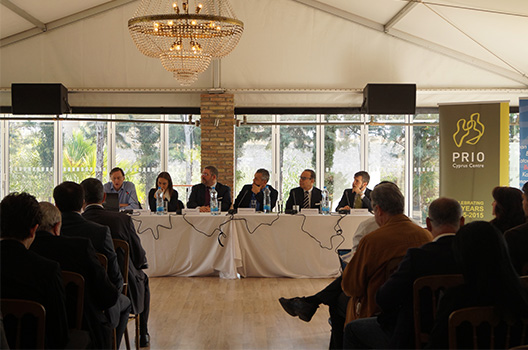On November 16, 2015, the Peace Research Institute Oslo-PRIO Cyprus Centre, in collaboration with the Friedrich-Ebert-Foundation in Cyprus and the Atlantic Council, organized its annual energy conference in the Nicosia UN Buffer Zone. The conference invited international experts to discuss the increasingly complex global energy landscape, paying particular attention to the Eastern Mediterranean region. The conference was convened by Atlantic Council Senior Fellow and Director of the PRIO Cyprus Centre Harry Tzimitras.
Under the title ‘Global Energy Debates and the East Mediterranean’, the conference comprised of three panels that offered numerous perspectives and insights into the global realities and trends that shape events related to energy security.
In the framework of the first panel, titled ‘Understanding the shifting global energy landscape: trends, pressures and drivers’, and anchored by Atlantic Council Senior Fellow John Roberts, speakers described the shifts in global energy production and consumption, as well as the changing patterns of oil and gas trade. They also stressed how the energy mix (r)evolution, with the rising share of renewables, unconventional fossil fuels and gas, might become a game changer in geopolitics, pointing also to the fact that, unless current prices recover, more global instability is to come. At the same time, speakers raised awareness regarding the significance of transparency and good governance in the utilization of the natural resources, stressing that the citizens, as the real owners of these resources, should have a say in their management. The panel touched also upon the current debates on the climate change in the face of the Paris UN Climate Change Conference.
Having established the bigger picture, the second panel focused on ‘Europe’s Energy relations’. The speakers initially drew the picture of the European energy landscape, explaining how the dependency of the European Union on energy imports forms the backdrop for policy concerns relating to the security of energy supplies. Special reference was paid to Russia’s energy politics, which remains one of the most significant energy suppliers for the EU. The speakers examined the legal aspects of the EU-Russia relations, drawing from the pricing policy of Gazprom. Furthermore, the role of Iran was examined as the world’s largest oil and natural gas reserves possessor in the international community, looking at the various domestic stakeholders that participate in the formulation of Iran’s energy policy. Finally, the panellists assessed the possibility for Turkey to emerge as a European gas hub in the future.
The third panel looked at the ‘East Mediterranean gas developments and options for regional cooperation: Cyprus, Egypt, Israel, and Lebanon’. The speakers started with a focused take on Cyprus, explaining how the economic arguments and the continuous gas price downturn have not been taken into consideration while debating the exploration and exploitation of the gas reserves around the island. They also assessed developments regarding Egypt’s Zohr field and explained how they might place Egypt in a better position vis-à-vis Israel. Additionally, the speakers talked about the natural gas developments in Israel and explained the reasons why the future management of the discovered natural gas reserves in the Israeli seabed has evoked an intense domestic debate. Finally, the speakers made some remarks on the case of potential gas reserves in Lebanon, the future management of which will depend on regional developments, with special reference to the ongoing conflict in the neighboring Syria.
On behalf of the organizers, we would like to thank all participants, in particular the guest speakers, for this insightful and interesting conference.
